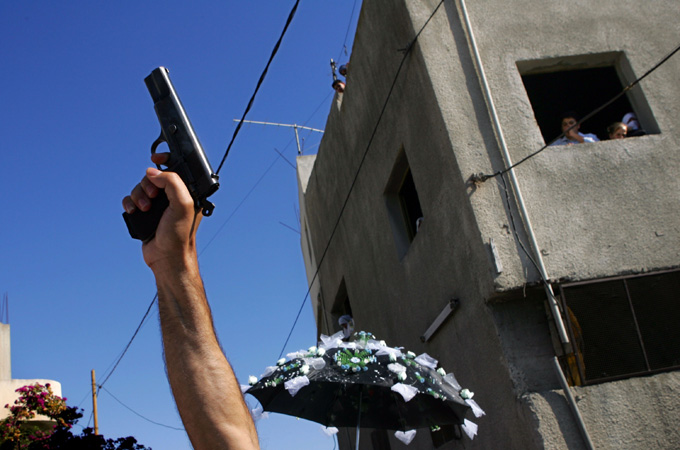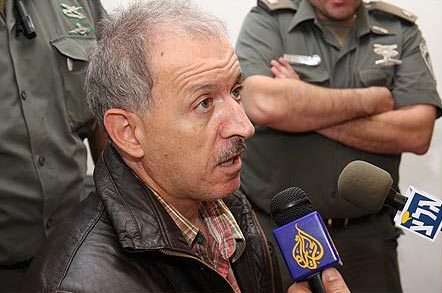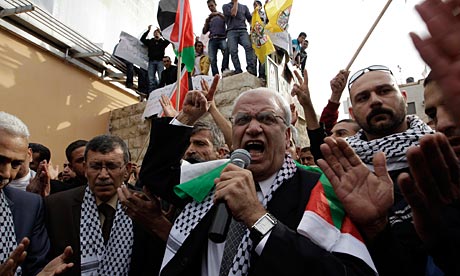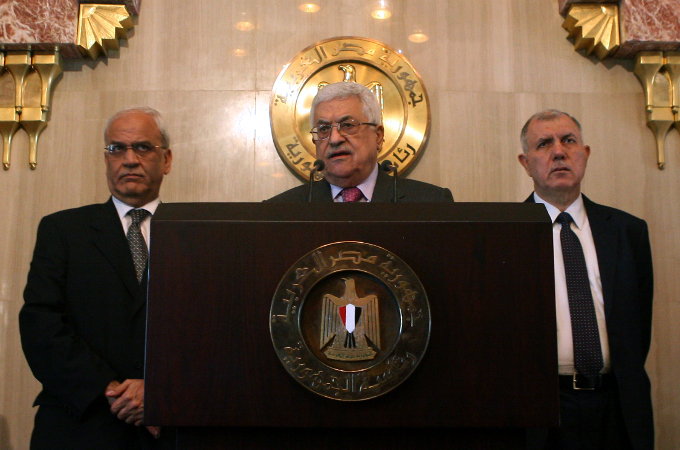EDITOR: Mubarak still has one reliable friend…
Below you can read about the one friend who still support Mubarak unflinchingly… it is of course Mr. Netanyahu. If there is one person in the whole world, whose support Mubarak could do without, it is Netanyahu, of course. How bizarre that he should try to shore him up with the very words which will prove fatal to his dear friend in brutality and opression. It seems that Netanyahu is constantly on the phone trying to save Mubarak… What has he in mind? Using the Israeli army to take over Tahrir Square?
Well, maybe he has two fiends left… Peres is also putting the knife in, by declaring unending, eternal love…
Israel urges world to curb criticism of Egypt’s Mubarak: Haaretz
Jerusalem seeks to convince its allies that it is in the West’s interest to maintain the stability of the Egyptian regime.
Israel called on the United States and a number of European countries over the weekend to curb their criticism of President Hosni Mubarak to preserve stability in the region.
Jerusalem seeks to convince its allies that it is in the West’s interest to maintain the stability of the Egyptian regime. The diplomatic measures came after statements in Western capitals implying that the United States and European Union supported Mubarak’s ouster.
Israeli officials are keeping a low profile on the events in Egypt, with Prime Minister Benjamin Netanyahu even ordering cabinet members to avoid commenting publicly on the issue.
Senior Israeli officials, however, said that on Saturday night the Foreign Ministry issued a directive to around a dozen key embassies in the United States, Canada, China, Russia and several European countries. The ambassadors were told to stress to their host countries the importance of Egypt’s stability. In a special cable, they were told to get this word out as soon as possible.
EU foreign ministers are to discuss the situation in Egypt at a special session today in Brussels, after which they are expected to issue a statement echoing those issued in recent days by U.S. President Barack Obama and Secretary of State Hillary Clinton.
Obama called on Mubarak to take “concrete steps” toward democratic reforms and to refrain from violence against peaceful protesters, sentiments echoed in a statement Saturday night by the leaders of Britain, France and Germany.
“The Americans and the Europeans are being pulled along by public opinion and aren’t considering their genuine interests,” one senior Israeli official said. “Even if they are critical of Mubarak they have to make their friends feel that they’re not alone. Jordan and Saudi Arabia see the reactions in the West, how everyone is abandoning Mubarak, and this will have very serious implications.”
Netanyahu announced at Sunday’s weekly cabinet meeting that the security cabinet will convene Monday to discuss the situation in Egypt.
“The peace between Israel and Egypt has lasted for more than three decades and our objective is to ensure that these relations will continue to exist,” Netanyahu told his ministers. “We are closely monitoring events in Egypt and the region and are making efforts to preserve its security and stability.”
The Foreign Ministry has called on Israelis currently in Egypt to consider returning home and for those planning to visit the country to reconsider. It is telling Israelis who have decided to remain in Egypt to obey government directives.
Gaza-Egypt border sealed indefinitely: Ma’an News Agency
January 31, 2011 – 12:00am
Egyptian authorities have closed the crossing with the Gaza Strip indefinitely as its army deploys in the northern Sinai, a Ma’an correspondent said Sunday.
Egyptian security contacted officials in Gaza to check up on the situation along the Rafah border, and Hamas authorities confirmed that large numbers of security officers were deployed at the crossing.
Authorities in Gaza also confirmed that strict instructions were given to smugglers telling them all tunnels would remain closed to ensure no Palestinians in Gaza were able to enter Egypt.
Gaza border official Ghazi Hamad said Rafah would be closed Sunday in both directions.
“Egyptian officials informed the crossing department in Gaza,” Hamad said highlighting that the terminal could remain closed for several days. He called on the Egyptian authorities to keep the crossing open “because closure harms passengers, especially those who need to travel to Egypt for medical treatment.”
Hamad pointed out that on Thursday and Wednesday, the Rafah crossing operated normally as about 500 people left to Egypt and 200 arrived in Gaza.
Egypt had opened Rafah permanently (five days a week) on June 2010 following an Israeli raid on a Gaza-bound aid flotilla. Before that, the crossing had been closed for three years.
Meanwhile crowds of protesters began massing in central Egypt for a sixth day of angry revolt against Hosni Mubarak’s regime, with over 100 already dead in protests demanding the veteran president quit.
Around 200 civilians spent the night on the central Tahrir square, the epicenter of protests since Tuesday, surrounded by army tanks although troops took no action against those breaking a night-time curfew.
More people began arriving on the square early Sunday, normally the start of the working week in Cairo, with a man waving an Egyptian flag as a military helicopter circled overhead.
Groups of club-carrying vigilantes slowly left the streets that they had been protecting from rampant looting overnight amid growing insecurity as the Arab world’s most populous nation faced an uncertain future.
Youths handed over to the army those they suspected of looting, with the police that has been fighting running battles with stone-throwing protesters in recent days hardly visible.
Many petrol stations are now running out of fuel, motorists said, and many bank cash machines have either been looted or are no longer working. Egyptian banks and the stock exchange have been ordered closed on Sunday.
Netanyahu warns outcome of Egypt revolution could be like Iran’s: Haaretz
Netanyahu meets with German chancellor to discuss Egypt crisis, Mideast peace; Merkel says Israel must freeze settlements to move peace process forward.
What happened in Iran could happen in Egypt, Prime Minister Benjamin Netanyahu said on Monday after meeting with German Chancellor Angela Merkel.
The German chancellor, who arrived in Israel earlier in the day, told Netanyahu during the meeting that it was especially important to move the peace process between Israel and the Palestinians forward in light of the unrest in Egypt.
In Israel’s neighboring Egypt, demonstrations and riots have continued unabated for almost a week straight. Netanyahu and Merkel reportedly spent a large amount of time during their meeting discussing the unrest.
Netanyahu said he feared that a radical Islamic regime like the one in Iran could also come to power in Egypt.
Prime Minister Benjamin Netanyahu with German Chancellor Angela Merkel before a meeting in Jerusalem on Jan. 31, 2011.
Peace talks initiated by the United States grinded to a halt in September after a 10 month freeze on West Bank settlement building expired. Attempts to restart the talks have since failed, with the Palestinians insisting that they won’t negotiate without a complete settlement freeze. Israel has meanwhile insisted that they are ready to continue negotiations, but they are waiting for the Palestinians to return to the table.
Netanyahu responded to Merkel by saying that settlements were not an obstacle to peace, adding that settlement building under his government has decreased greatly in comparison to previous governments. He also said that it was up to the Palestinians to return to the negotiating table and renew peace talks.
Senior officials in Merkel’s office have said recently during closed door briefings that the chancellor will be very tough with Netanyahu and will use the meeting as a chance to tell him that it is his responsibility to renew the peace negotiations with the Palestinians.
Merkel arrived in Israel on Monday as part of the third round of talks in an ongoing dialogue between the two countries.
Peres: Israel has great respect for Egyptian president: Jerusalem Post
01/31/2011 15:48
President Shimon Peres has not abandoned his old friend Egyptian President Hosni Mubarak. “We always have had and will have great respect for President Mubaraek. Not everything he did was right, but he did do one thing for which all of us are thankful. He was the peace keeper of the Middle East,” Peres told incoming Costa Rican Ambassador Rodrigo Carreras, the first of five new ambassadors who on Monday presented their credentials. The others were Estonia’s Tiina Intelmann, Chile’s Joaquin Montes Larrain, Bulgaria’s Yuri Borissov Sterk and Ethiopia’s Helawe Yosef Mengistu.
Acknowledging that Mubarak had not always taken an ideal course, Peres, alluding to the riots in Egypt and the current regime in Iran, declared “a fanatic religious oligarch is not better than lack of democracy.” He then went on to say that most people think that democracy is only elections. But democracy is much more, he asserted. It is also peace and freedom.
From the front lines of the Egyptian uprising: The Electronic Intifada
Matthew Cassel, 30 January 2011
It’s been a long time coming, but change is on its way to Egypt.
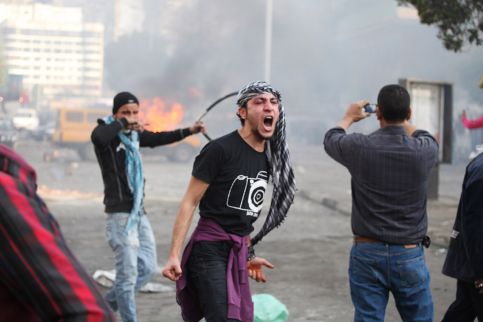
In the working-class area of Imbaba in Cairo on Friday, 28 January, I and my companions joined a group of fifty or so protesters marching up and down the street. The crowd shouted “come down! come down!” to neighbors. Without even realizing that others were joining I looked back at one point to see that 50 had become 500, and not long after I couldn’t see the end of the mass marching through the streets.
As we marched, the Egyptian police hiding in their armored vehicles waited until the march got close. When it did they fired tear gas indiscriminately. People fled, and bystanders, including old women and children in their homes, panicked by the suffocating fumes of the tear gas, which was all marked “Made in the USA.”
The crowds dispersed, but only briefly. Moments later the mass was reformed and the march continued. Down one street and then another, it had no direction, no leadership. Just deep anger and frustration at thirty years of what everyone has been describing as a dictator whose corruption has destroyed the country. Despite the fact that they cannot communicate with each other now, nor could they organize freely or have access to a free media for thirty years, Egyptians from across the country have been unequivocal in their one demand: Mubarak must go.
Finally, when the march in Imbaba reached a certain point, the police decided it was enough. They formed a blockade and when the protesters neared, the gas began to fly. Non-stop tear gas — even two days later I can still smell it on my clothes. People fled, and they returned. It was an organic uprising that could not be stopped, the likes of which I had only previously seen in one place: Palestine.
The intifada was an organic uprising when Palestinians said enough was enough. Without even having to think, people took to the streets to challenge the oppressive rule of their Israeli occupiers. They were killed, beaten, arrested — but nothing could stop them. Egypt today is no different.
While it cannot be described as a foreign occupation, the oppression is there. And in both cases, the one supporting and financing the oppression is the same. Without the US government’s billions of dollars to both Israel and Egypt, there would be no intifada. There would be no deaths now, there would be no thugs roaming the streets and reports of bodies being dumped on the side of the road. That’s not to say without the US there would be a utopia, but without the US there sure as hell wouldn’t be this.
Now US State Department officials are calling on the Egyptian government to refrain from violence and making statements that feign concern about Egyptian lives. If that was true, the tear gas would not say “Made in the USA,” and a brutal dictator would not be supported with billions each year to oppress his people.
But US foreign policy that is becoming irrelevant, a failed imperialist ideology that people are standing up to. Resistance is taking over. And like in Imbaba, or Tahrir Square, or anywhere else, it’s not resistance of any one color. Hostile media appear to be hoping, as they did for Tunisia, that it has an Islamist element.
It doesn’t. The resistance is led by the people of this region, whatever their background may be. At Tahrir Square in central Cairo yesterday I saw young communist women chanting for Mubarak’s ouster next to men who minutes later were on the ground praying. Like in Lebanon, resistance against Israel and US intervention has widespread support, even if the military aspect of such resistance is led by Hizballah, a religious movement. You won’t find many Lebanese to tell you that they do not support resistance to Israel’s attacks on their country.
And the resistance is spreading. Here in Egypt, it appears to be unstoppable. After thirty years of Mubarak’s suffocating rule, the people are finally saying enough. There is hardly one place in the entire country where the dictator can go to escape the shouts demanding his overthrow. In response, he’s cut off communication. The Internet is still down, so is SMS. Mobile phones are only working sporadically. Today, Mubarak’s Minister of Information, who was supposedly dismissed on Friday in an attempt to placate demonstrators, came out and revoked Al Jazeera’s press credentials and ordered a shut down of what’s become the world’s most important news organization.
What makes an unstable situation all the more unsettling is that people are not only unable to communicate with the outside world, but also with their friends and loved ones inside the country. And this was the government’s tactic to try and terrorize its people even further and frighten them from going out into the streets in protest. It didn’t work. On Friday hundreds of thousands came out around the country to take their demands for change into the streets.
Yet in Egypt and beyond, resistance is spreading. It’s impossible to say when it started. In Egypt it was the killing of Khaled Said, the young man stomped to death by Egyptian police in June of last year Alexandria that brought protesters to the street on 25 January to protest the police and their dictator. Was it was the popular uprising in Tunisia that ousted that country’s Western-backed dictator of 23 years that sent shockwaves of inspiration throughout the Arab world? Could it have been Hizballah’s defeat of Israel during the latter’s war on Lebanon in 2006? Or the failed war on Iraq that the US cannot escape? Or the Palestinian steadfastness in their decades of struggle to liberate their lands?
Regardless of what sparked the situation that exists today, Arabs are uniting in their resistance to Western interference in the region and its oppressive autocracies. As one Egyptian activist said to me yesterday, “They try to say that we Arabs are all different and we’re disconnected. But look what’s happening now: uprisings in Tunisia, Egypt, Yemen — even Jordan! We are one, it’s absolutely clear.”
The people in Imbaba, who faced wave after wave of US made weaponry, fought back and refused to give up. After the first few hours protesters grew used to the tear-gas. I know because I was at their side documenting their struggle. I could feel the effects of the stinging gas less and less as time went on. I no longer had to run into alley to breathe fresh air after inhaling the poisonous fumes. The protesters bravely pushed forward until after almost six hours the police retreated.
This wasn’t an isolated protest. It was only one of many happening around the country. Compared to other reports, it was actually one of the smaller ones in Cairo. Now, it’s up to the world and those in solidarity with Egyptians to take a stand and demand that the killing end and the Egyptian people’s grievances be met. The longer we delay, the more Egyptian blood will be spilled. With billions of US support each year, the Mubarak regime has had the resources and the time to develop well-armed and well-trained forces to repress those forced to suffer under his rule.
My taxi driver last night was in tears when he described to me how difficult the last thirty years has been for not only him, but every single Egyptian in every part of this vast country. “We want freedom, that’s it,” he told me. A simple demand, and one that we all have a duty to support.
Matthew Cassel is based in Beirut, Lebanon and is Assistant Editor of The Electronic Intifada. His website is justimage.org.
